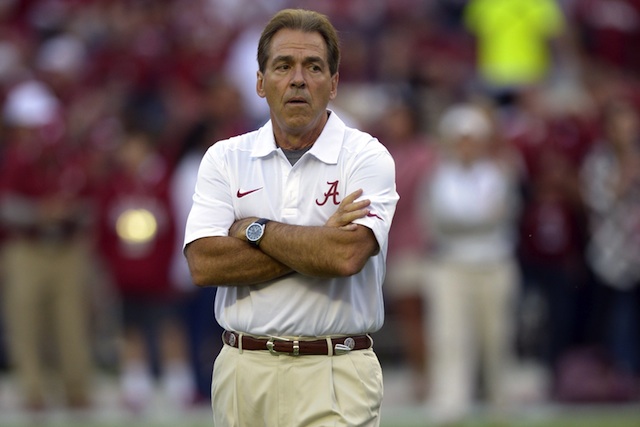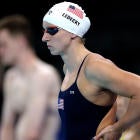
DESTIN, Florida -- SEC coaches came to their annual spring meetings feeling disadvantaged. Some of them want the entire country to adopt their rule banning satellite summer camps. Some want the SEC to be on the same page with other conferences when it comes to accepting graduate student transfers.
This attitude of feeling disadvantaged was summed up by Alabama coach Nick Saban, who said Tuesday he wants all five major conferences to use the same rules.
“These things need to be global, otherwise we’re going to become a farm system for all the other leagues,” Saban said. “And then the first question we’re going to get asked is, we win seven national championships in a row and (reporters ask), 'Well, what’s the state of the SEC? You haven’t been in the championship game the last two years.'”
Saban made a passionate argument that the SEC, ACC, Big Ten, Big 12 and Pac-12 need to have the same rules in all five leagues.
“If we’re going to compete for the championship and everybody is going to play in the playoff system and everybody is going to compete for that, we need to get our rules in alignment so we’re all on a level playing field, whether they’re transfer rules, whether they’re satellite camp rules,” Saban said.
“It’s a disadvantage not to be able to do something in one league and be able to do it in another. It’s a disadvantage to be able to recruit a player in one league and not be able to do it in another.”
Saban might as well have been speaking directly about former Notre Dame quarterback Everett Golson, who recently left for immediate eligibility at Florida State as a graduate transfer.
Alabama, Georgia and Florida were SEC schools interested in Golson, but the SEC requires a waiver process approved by the conference commissioner to accept grad transfers. Golson would not have met one SEC criteria that states the grad transfer was not subject to any disciplinary action at his previous school. Golson was suspended for a year at Notre Dame after he cheated academically on a test.
Florida coach Jim McElwain said Golson visited Gainesville but “we didn’t get that far” on whether the Gators could have gotten him into school. McElwain said Florida did not submit a waiver request to the SEC. “We’re aware of the rules,” McElwain said. “We spoke with some people.”
McElwain described Golson as a “guy who paid his dues, went back, finished, got a degree from a pretty decent university -- Notre Dame’s not bad, I guess -- and did it the right way. That being said, I wish him the best. He’s a quality person. I don’t want to play against him, but we’re gonna.”
Georgia coach Mark Richt declined to discuss the Bulldogs’ recruitment of Golson or whether the school submitted a waiver request to the SEC office. SEC commissioner Mike Slive said there were inquiries but no formal action for a waiver regarding Golson.
“I think most people know why that rule came into effect,” Richt said, apparently referring to Jeremiah Masoli’s transfer from Oregon to Ole Miss in 2010 as a grad transfer with immediate eligibility despite being dismissed by the Ducks. “I don’t know if anybody ever requested a waiver for that particular situation, but if there are chances to get a waiver, I think if it makes sense, that’s something you would do.”
Some SEC coaches are also up in arms over coaches in other leagues staging summer camps in the Southeast. The NCAA allows coaches to hold football camps on their own school’s campus or nearby, but they’re allowed to be guests at out-of-state camps. Many conferences don’t seem interested in changing the NCAA rule, meaning to fall in line the SEC would have to change its rule that currently prevents coaches from making guest camp appearances.
Speaking last month, Big Ten commissioner Jim Delany pushed back at the satellite camp complaints from SEC coaches. Delany said any national discussion about satellite camps should also include an examination of oversigning, grayshirting and "flipping" recruits -- practices that generally occur more frequently in the SEC.
Saban also wants a cap on cost of attendance figures for each school, pointing out that the NFL has a salary cap on players. However, he’s ignoring that such a cap right now would be illegal based on a federal judge’s ruling in the Ed O’Bannon case.
Left unspoken about the idea of everyone playing by the same rules: Professional athletes collectively bargain over their rules. The NCAA, conferences and schools are aggressively fighting efforts for college athletes to be declared employees and have the right to form a union.
Also, the idea of a level playing field is long gone in college sports. That was the entire point of autonomy allowing the five major conferences to create some of their own rules.
"We made the incoming student-athletes of the next century the primary focus so we moved from level playing field to student-athletes," Slive said. "By definition when you do that, you end up with issues that aren’t as comfortable if you’re grounded in and had experience in the level playing field."
Ultimately, though, there’s a bigger problem with Saban’s thinking for all five major conferences to have the same rules. Different universities have different missions.
This is the line of thinking Saban and most SEC coaches and administrators have said through the years whenever the idea of an SEC-wide drug policy gets discussed. SEC schools have said they like to have a certain level of control over discipline, creating imbalance within the conference over how drug testing works and the penalties for positive tests.
In a way, the same is true in relation to other rules the SEC wants changed. Good luck getting Power Five schools with vastly different philosophies on the same page for every single rule.
“I think it would make sense,” said Richt, a member of the new NCAA football oversight committee. “But obviously in a league like the NFL, everybody’s on the same page. The owners are making the rules. Every university is different -- different philosophies, traditions, just ways of doing things. To get everybody on the same page like that, I don’t know if it’s possible. Over time, I think we could get closer and closer to that.”















